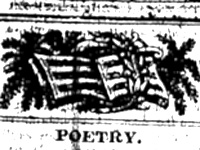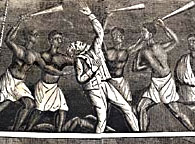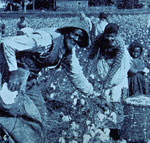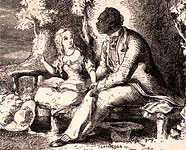Emancipation and Black Soldiers
Professor Mackubin T. Owens looks at the role of African-American soldiers in the Civil War and the effects of the Emancipation Proclamation on the U.S. African-American population in general.
Professor Mackubin T. Owens looks at the role of African-American soldiers in the Civil War and the effects of the Emancipation Proclamation on the U.S. African-American population in general.
Professor Mackubin T. Owens describes Lincoln's actions as a leader during the Civil War, the strategies he employed during the war, and his success or failure as such a leader.
Professor Mackubin T. Owens traces the flow of antebellum history, up to the Civil War, examining the many changes and pushes for more change that characterized this period.

Freedom's Journal, published weekly in New York City between 1827 and 1829, was the first African American owned and operated newspaper in the U.S. This website presents digitized copies of all 102 issues of Freedom's Journal, available for download in PDF format. In the pages of this newspaper, visitors will find regional, national, and international news, anti-slavery and anti-lynching editorials, and biographies of prominent African Americans, as well as items of interest to New York's African American community, such as obituaries, births, and marriages. The website also provides several links to additional resources on the black press, including a brief biography of Freedom's Journal and a piece by one of the newspaper's subscription agents: David Walker's 1829 Appeal, which called for slaves to revolt against their masters, and is "arguably the most radical of all anti-slavery documents."

This is one of the richest collections of anti-slavery and Civil War materials in the world. Reverend Samuel J. May, an American abolitionist, donated his collection of anti-slavery materials to the Cornell Library in 1870. Following May's lead, other abolitionists in the U.S. and Great Britain contributed materials. The collection now consists of more than 10,000 pamphlets, leaflets, broadsides, local anti-slavery society newsletters, sermons, essays, and arguments for and against slavery. Materials date from 1704 to 1942 and cover slavery in the United States and the West Indies, the slave trade, and emancipation. More than 300,000 pages are available for full-text searching. Accompanying the documents are eight links to other collections.

More than 100 published materials on legal aspects of slavery are available on this website. These include 8,700 pages of court decisions and arguments, reports, proceedings, journals, and a letter. Most of the pamphlets and books pertain to American cases in the 19th century. Additional documents address the slave trade, slave codes, the Fugitive Slave Law, and slave insurrections as well as presenting courtroom proceedings from famous trials such as the 18th-century Somerset v. Stewart case in England, the Amistad case, the Denmark Vesey conspiracy trial, and trials of noted abolitionists John Brown and William Lloyd Garrison. A special presentation discusses the slave code in the District of Columbia. Searchable by keyword, subject, author, and title, this site is valuable for studying legal history, African American history, and 19th-century American history.

A memorial to Roland Marchand, the late historian of popular culture and advertising, this website presents a slide library with more than 6,100 images, including more than 2,000 advertisements, drawn from Marchand's collection. The images are organized into more than 40 major categories and close to 200 subcategories.
The site also offers 48 lesson plans designed by Marchand, each with an introduction, an essay assignment, and 10 to 40 primary source documents. The lessons cover a diverse range of controversial topics, including the Antinomian Controversy, the reactions against Chinese immigrants, the Pullman Strike, the Women's Suffrage Movement, and Watergate. The site will be useful for researching popular culture and advertising, as well as numerous other topics in American history, such as women, wars, immigration, labor, and African Americans.

This well-designed, comprehensive website explores Harriet Beecher Stowe's Uncle Tom's Cabin as an American cultural phenomenon. "Pre-Texts, 18301852" provides dozens of texts, songs, and images from the various genres Stowe drew upon, including Christian texts, sentimental culture, anti-slavery texts, and minstrel shows. The section on the novel includes Stowe's preface, multiple versions of the text, playable songs from the novel, and Stowe's defense against criticism.
A third section focuses on responses from 1852 to 1930, including 25 reviews, more than 400 articles and notes, as well as nearly 100 responses from African Americans and almost 70 from pro-slavery adherents. "Other Media" explores theatrical and film versions, children's books, songs, poetry, and games. Fifteen interpretive exhibits challenge users to investigate how slavery and race were defined and redefined as well as analyze how various characters assumed a range of political and social meanings.